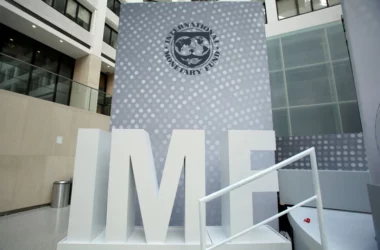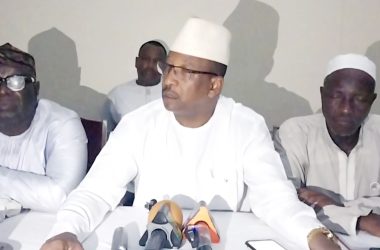 (JollofNews) – Over the past weeks and months the Coalition has managed to articulate non-partisan messages in order to appear as a unified unit in public. But it has become increasing apparent the mimicry unity could not hold parties’ combatants together to strategically contest the forthcoming parliamentary election.
(JollofNews) – Over the past weeks and months the Coalition has managed to articulate non-partisan messages in order to appear as a unified unit in public. But it has become increasing apparent the mimicry unity could not hold parties’ combatants together to strategically contest the forthcoming parliamentary election.
The combatants seem unwilling to unleash their respectable positions for a compromised decision. There are suggestions from some quarters that the fragmentation was caused by ideological differences as members aspire to pursue their own party’s agendas, whatever the case is, the future composition of the Coalition has become less predictable, dependant on the outcome of the parliamentary election. Perhaps, this is an opportunity for the reconfiguration of the coalition after election results’’. Who knows who is in, or who is out after election night?
This represents the characteristics of multiparty politics, ambivalence at best, confusion and instability at worst.
Of course it is not unusual for political parties to divide over policies for ideological reasons. But it is politically prudent for the Coalition to agree on measures that are necessary for it to function as an effective government. Without a majority in the National Assembly the Coalition may not be able to accomplish what it sets out to achieve. Therefore, any form of strategic alliances or even in the spirit of alliances will greatly bolster the Coalition’s grip on power. That is what I call as Smart Politics, the politics that protects citizen’s ‘common good’.
Certainly, the agreement forged to bring the nines parties together was effective in ousting the previous executive, but seems to be conflict with the constitution. I would argue that by limiting the term of the Coalition to three years, this has tacitly limited the term of the president to the same period. A departure from the dictate of the constitution which sates this: ‘The term of office of an elected President shall——– be for a term of five years’. This raises the question whether the Coalition’s agreement is unintended violation of the relevant provisions of the constitution.
By any interpretation, a citizen who has been elected under the mandate of the constitution has the right to serve for five years, unless his/her presidency is invalidated by the reasons stated in the constitution. The rule of law is not satisfied by having rules of law or a law of rules, but it must guaranteed the fundamental human right, including citizens’ political rights. In this regards, the agreement cannot subvert the constitution.
In my view, the Coalition’s agreement can be construed as a contractual in nature that only bound parties of the contract. Therefore, it is plausible to suggest that the Coalition’s agreement cannot limit the term of presidency. In any case if we accept the fact that, a contract may be terminated by the conduct of the parties to the agreement, therefore, the Coalition’s stance on the parliamentary election serves as a death knell to its initial agreement.
Consequently, the fixed term of the president stipulated in the constitution must prevail. It is also the case that holding election within threes does not seem sound, given the dire status of the Gambia’s economy.
Nonetheless, parties’ combatants are all heading out anxiously to respective constituencies equipped with the best weaponry, in a desperate search for possible votes. Their deliberations are bound to be full of divisive issues, promises, even personal vilifications that are designed to influence citizen’s political choice for representation. Despite this we must demand political parties to spell their proposed policies in simple terms, so we understand the ways in which they intended to govern to protect the interests of the represented.
What seem pointless is for political parties to deliberate on policies that are impossible to pursue in future. As Thomas Hobbes observed long ago, there is no point in deliberating over issues that cannot make any material difference to the outcomes that are transformative. So therefore, big promises that failed to take into account the economic reality may never come to realisation, at disappointments of the voters. Indeed, the prospective representatives have to act in responsive manner to the voters’ interests. These interests must be captured in parties’ manifestos to allow post-election accountability.
I do hope that all political parties are committed to building of a fairer society equipped with good roads, good schools, and good hospitals in order to root out the structural inequalities that are embedded in our society. But it is also incumbent upon on citizens to deselect self-serving politicians.
Undoubtedly, the APRC is in a better political position than most political parties given its 22 years of ruling. Although its support has been haemorrhaged by the rise of GDC, the party can still hold on sizeable proportion of its last votes if it machineries are tactically deployed. As a legitimate political party, its life span is not dependent on few individuals. It is a legal entity created in accordance with the constitution to partake in Gambia’s political life. Therefore, such role must be protected for the interest of the society. In any case; a pluralistic democracy requires multiparty system with divergent political views.
It is seems right to suggests that outcome of the parliamentary election will mark a new turning point in Gambians’ politics.
In conclusion, I leave with the wise words of Plato (a Philosopher), albeit with slight alliterations to suit my purpose. As he asserted this; ‘‘one of the penalties of refusing to participate in politics, is that you end of being governed by your political enemies’’.
Forward with the Gambia!!
Solomon Demba













Sawaneh, to use the United States as many of your travelling companions for UDP have as a cheap shot at Hon. Halifa Sallah is not only wrong but intentionally misleading. First, the United States did Not Have a Memorandum Of Understanding going into any of the Modern Recent Elections in the United States. Second, the United States unlike the Gambia does not Operate on a Parliamentary Political System.The United States is Not only a Representative Democracy, but Allocates the Lower and Upper House aka the House of Representatives and the Senate’s Votes by Proportional Representation from the Population of a given State and Congressional Constituancy. That is due to the Connecticut Compromise which sought to Level the Political Field between the more Populous States and the Lesser Ones. Do we have this in the Gambia or British Parliamentary System from which the Gambia Copied its Existing Political System? Not at all. For any Honest and individual of sum amount of Integrity to try to Equate American Political System, goes to show the length and width some would Compromise their Ethics and Morals to Argue the Unjustifiable. Why engage in such “intellectual” Dishonesty? Simple. Ethnic Group Based Party Politics, Not Ideological or Policy Based Platform as a is in the United States. Another Significant difference between the United States and The Gambia, is the Electoral College. Remember I mentioned Representation Government being a Defining feature of the United States Political System, the Electoral College is the Institution that Directly Electes the United States President. The Popular Votes, which Hillary Clinton Won by a Whopping Votes of almost Three Million and Still Not Win the United States Presidency is Not the Determinant Factor. It is the Electoral College Votes that the United States President gets as Pledged by the Constituancy, Counties, Precients and States. Coalition Alliance was an Amalgamation of Eight Parties including UDP which all Agreed Upon and Signed the MOU to Work together as One to Contest for the Presidency and if they Win, they would Govern as a Coalition Alliance Government for a Period of Three Years. How then can a President who was a UDP Member and not just any Rank and File Supporter, but infact, an Official in the position of “UDP Party Book Keeper/Financial Manager” as reported by Adama Barrow himself, but had to resign from the UDP Party in order to be run for the Coalition Alliance Presidency be impartial in Cynical and Opportunistic Ethnic Group Based Party Politics AKA Tactical Alliance. How is Tactical defined in this case? Alliance with whom and for what? UDP was already in a Tactical Alliance within the Coalition Alliance Government with Seven Parties. Why break that Tactical Alliance and Illegally break some might say, the MOU that gave the Same UDP Candidates Contesting under the so-called Tactical Alliance Parliamentary Elections, their Cabinet Positions? Answer, Ethnic Group Based Party Politics. It seems to me, that if the MOU is Binding and Enforceable, and I believe it to be, all Cabinet Positions Occupied by UDP Candidates, Mai Fatty and Hamat Bah and other Members of the Current Tactical Alliance Should Resign. They have by Virtue of Nullifying and Voiding the MOU, have in the Spirit and Letter of the MOU Retroactively Nullified their Legitimatimacy. In a True Parliamentary System, the Coalition Alliance Government Cabinet Should or Would be DISSOLVED and Elections Held within the Proscribed Constitutional Mandate. They Owed their Cabinet Positions to the MOU and inturn to the Coalition Alliance that they Now Step on After Tearing it into Pieces and using it as Means to an End of UDP and Mai Fatty and Ousainou Darbo Ethnic Group Based Party Hegemony. Any Violation of the MOU, is a Violation and Rejection of the Coalition Alliance Government’s Presidency. Adama Barrow being a Part and Parcel of the UDP Party would not feel that way. However, if he was from another Party Whoes Position is being Undermined in a Malfeasant and Potentially illegal manner, he and his Party and Party Supporters would Cry Foul Against UDP and Mai Fatty and their Supporters. An MOU is Not a Toilet Paper to be Used and Discarded by Any of the Signatory Political Party’s Leadership. In fact, this is a Significant Test of the UDP Regime of Ousainou Darbo and Mai Fatty and their Fronted President, Adama Barrow’s Commitment to a Democratic Dispensation and TRUELY Broad Based Governance, and the Truth and Evidence is, UDP and Mai Fatty and Ousainou Darbo with Adama Barrow Failed the Gambia and Gambians. They failed the Accountability, Honesty, Due Diligence to the MOU and Coalition Alliance and to the Democratic Dispensation so fought for by all Gambians and Ethnic Groups. UDP’S Succeess, is a Direct and Commensurate Setback to a Free and Democratic Gambia. Gambia is More than
The Sum Total of One individual Ethnic Group and Region. One Gambia, One People, One Destiny.